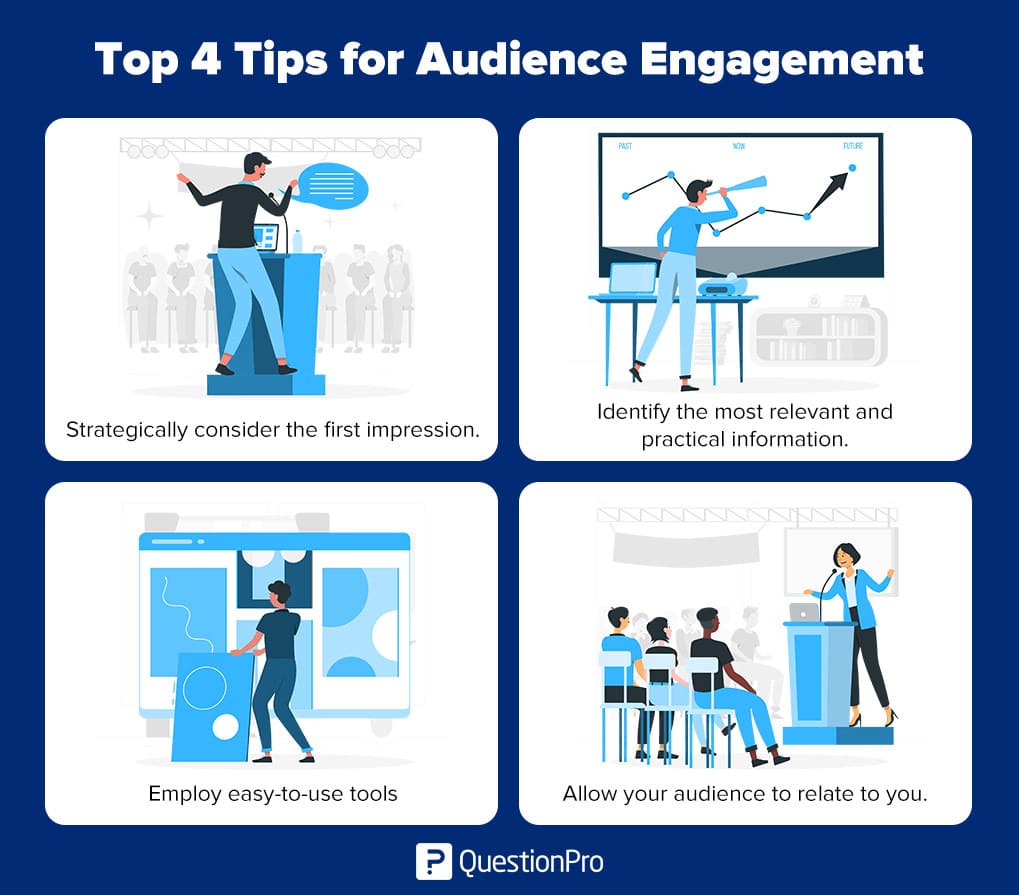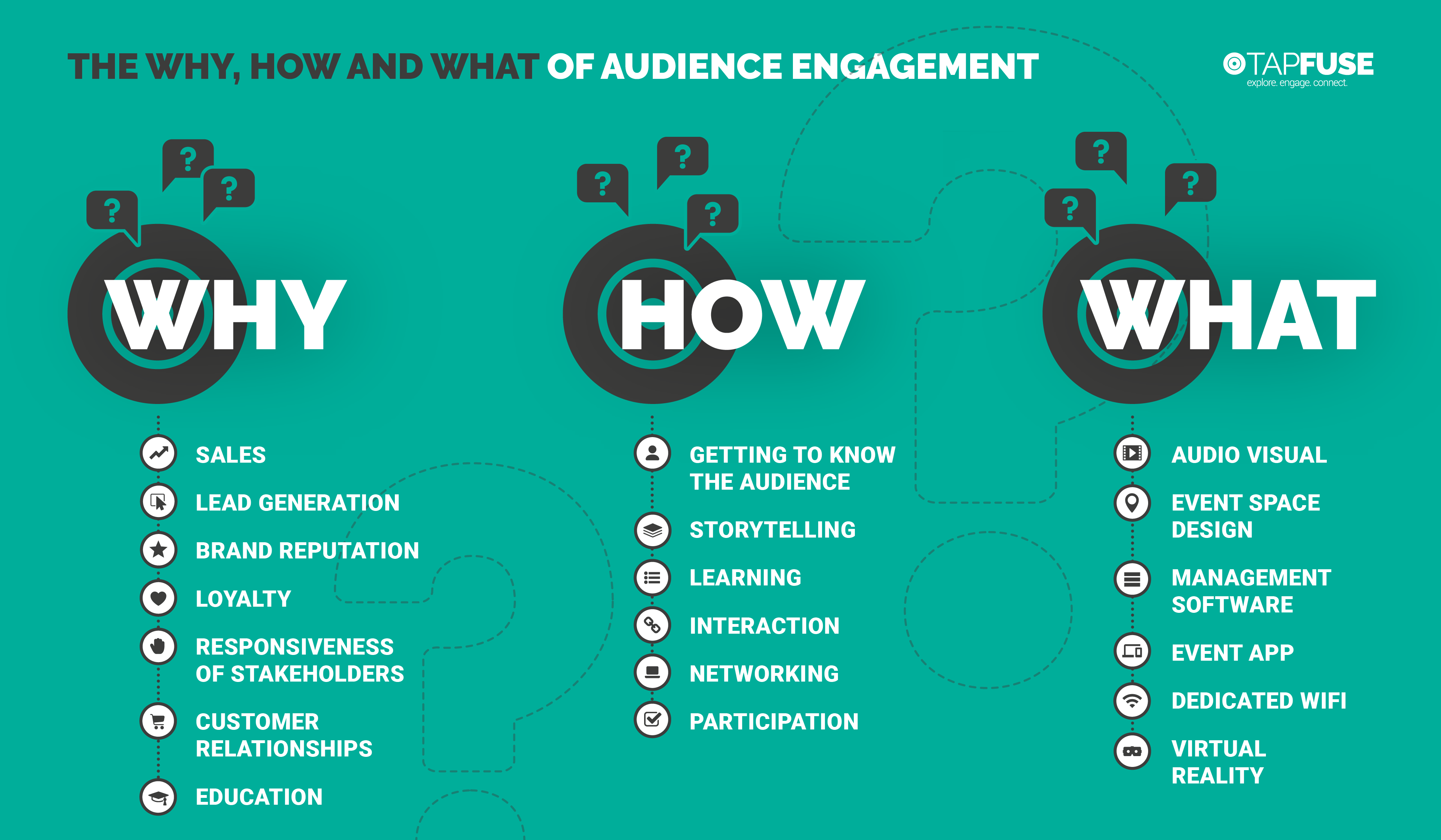What Is Audience Engagement?
Audience engagement refers to the efforts made to encourage and involve the target audience in a meaningful way. It encompasses various strategies used to connect with the audience and create interactions that build loyalty and growth.
By implementing audience engagement techniques, businesses and brands can effectively capture the attention, interest, and participation of their target audience, thus fostering relationships and enhancing brand recognition. This not only helps in increasing brand loyalty but also drives conversions and strengthens the overall customer base.
From social media campaigns to interactive content, audience engagement plays a crucial role in establishing a successful online presence and achieving marketing goals.
The Importance Of Audience Engagement
Audience engagement is a crucial aspect of any successful online business. It refers to the way in which your audience interacts and connects with your brand and content. By actively engaging your audience, you can build lasting relationships, increase customer loyalty, and improve brand perception. Let’s explore the significance of audience engagement in more detail:
Increased Customer Loyalty
A primary benefit of audience engagement is the ability to cultivate increased customer loyalty. When your audience feels valued and connected, they are more likely to stay devoted to your brand. By consistently engaging with your audience through meaningful content, responding to their comments and queries, and actively involving them in your brand story, you can foster a sense of loyalty that translates into repeat business and long-term customer relationships. This loyalty results in a stable customer base that is less likely to be swayed by competitors.
Improved Brand Perception
Another vital aspect of audience engagement is the impact it has on brand perception. When your audience actively engages with your content, it indicates that they find value in what you offer. This positive perception is crucial for building a strong brand image. By consistently providing relevant and engaging content, and actively seeking feedback from your audience, you can establish credibility and trust. As your audience engages with your brand, they become advocates, spreading positive word-of-mouth and amplifying your brand’s reach and authority.

Credit: aimtell.com
Strategies For Audience Engagement
Audience engagement is a crucial element for the success of any online platform, whether it’s a blog, a social media page, or a website. The more engaged your audience is, the more likely they are to visit your site frequently and share your content with their networks. In this blog post, we will explore some effective strategies for audience engagement.
Creating Interactive Content
Interactive content is any type of content that encourages the audience to actively participate in the experience rather than passively consuming it. By creating interactive content, you can make your audience feel more involved and connected to your brand or website. Here are some strategies you can use to create interactive content:
- Create quizzes or questionnaires related to your industry or niche.
- Include interactive elements such as sliders, calculators, or mini-games in your content.
- Encourage your audience to leave comments, share their thoughts, or ask questions in the comments section.
- Add opportunities for your audience to contribute to your content, such as accepting guest posts or featuring user-generated content.
Running Polls And Surveys
Polls and surveys are powerful tools for engaging your audience and gathering valuable insights. They allow you to understand your audience’s preferences, interests, and opinions while also making them feel heard and valued. Here are some strategies for running effective polls and surveys:
- Keep your polls or surveys short and simple to encourage more participation.
- Ask specific and targeted questions to get meaningful responses.
- Consider offering incentives, such as exclusive content or discounts, for completing the poll or survey.
- Share the results of the polls or surveys with your audience to keep them engaged and show that their input matters.
Engaging your audience is essential for building a loyal following and driving traffic to your website. By implementing these strategies for audience engagement, you can create a more interactive and valuable experience for your audience, keeping them coming back for more.
Utilizing Social Media For Engagement
Utilizing social media for engagement is an essential strategy for businesses looking to connect with their audience and build meaningful relationships. Social media platforms offer the perfect opportunity to engage with your audience on a personal level, fostering a sense of community and eliciting user-generated content. In this section, we will explore two key ways to leverage social media for audience engagement: building an active community and leveraging user-generated content.
Building An Active Community
Building an active community on social media involves more than just broadcasting your message. It requires creating a space where your audience feels welcome, valued, and connected. Here are some effective strategies to build an active community:
- Encourage conversation: Ask thought-provoking questions and encourage your audience to share their opinions and experiences. This helps create a sense of belonging and encourages active participation.
- Respond and engage: When your audience interacts with your posts or leaves comments, make an effort to respond and engage in conversations. This shows that you value their input and fosters a sense of community.
- Create exclusive content: Offer your social media followers exclusive content, such as behind-the-scenes footage, sneak peeks, or exclusive discounts. This makes them feel special and encourages them to actively participate in your community.
Leveraging User-generated Content
User-generated content is a powerful tool for audience engagement. When your audience creates content related to your brand and shares it on social media, it not only generates buzz but also strengthens their connection to your brand. Here’s how you can leverage user-generated content:
- Run contests and campaigns: Encourage your audience to create and share content by running contests and campaigns that require user participation. This could be as simple as asking them to share their favorite product photo or share their success stories related to your brand.
- Showcase user-generated content: Highlight and showcase the user-generated content you receive. Reposting their content on your social media channels not only gives recognition to your customers but also encourages others to participate.
- Create user-generated content campaigns: Create campaigns that invite your audience to actively contribute content related to your brand. This could be in the form of challenges, hashtags, or viral trends, creating a buzz around your brand and increasing audience engagement.
By utilizing social media for engagement through building an active community and leveraging user-generated content, businesses can establish a strong connection with their audience while driving brand awareness and fostering organic growth.

Credit: www.questionpro.com
Measuring Audience Engagement
Audience engagement is a crucial aspect to consider when it comes to the success of any online business. It refers to the interaction and involvement of your audience with your content, products, or services. Measuring audience engagement allows you to gain valuable insights into how well your audience is responding to your efforts, enabling you to optimize your strategies and achieve better results. By understanding the preferences and interests of your audience, you can create a more personalized and impactful experience for them.
Using Key Performance Indicators
In order to measure audience engagement effectively, you need to identify and focus on key performance indicators (KPIs) that are relevant to your business goals and objectives. KPIs are specific metrics that provide insights into the effectiveness of your marketing efforts. By tracking and analyzing these indicators, you can gain a clear understanding of the engagement levels of your audience.
| KPI | Description |
|---|---|
| Pageviews | The number of views your web pages receive. |
| Time on Page | The average amount of time visitors spend on your web pages. |
| Bounce Rate | The percentage of visitors who leave your website after viewing only one page. |
| Conversion Rate | The percentage of visitors who take a desired action on your website, such as making a purchase or signing up for a newsletter. |
Analyzing Social Media Metrics
Social media platforms provide a wealth of data that can be analyzed to measure audience engagement. By examining various social media metrics, you can gauge how well your content is resonating with your audience and whether they are actively engaging with it.
- Likes and Shares: The number of likes, shares, and comments your posts receive.
- Click-through Rate: The percentage of people who click on the links in your social media posts.
- Reach: The number of unique users who see your content.
- Engagement Rate: The ratio of interactions (likes, shares, comments) to the number of followers or views.
By regularly monitoring and analyzing these social media metrics, you can gain valuable insights into the level of engagement your audience has with your content. This will help you identify trends, preferences, and opportunities to further optimize your social media strategies.
Best Practices For Increasing Engagement
Audience engagement refers to the level of interaction and participation from readers or viewers. It involves creating content that is relevant, valuable, and interesting to encourage active involvement, such as commenting, sharing, or liking. By implementing best practices like using captivating headlines, including multimedia, and sparking conversations, you can increase engagement and build a loyal audience.
Increasing audience engagement is crucial for the success of your online presence. By implementing the following best practices, you can create a more personalized experience, encourage valuable user feedback, and ultimately boost your engagement levels.
Personalizing Content
Personalizing content is a powerful way to connect with your audience on a deeper level. When your visitors feel like the content is tailored specifically for them, they are more likely to engage. Here are some effective ways to personalize your content:
- Create buyer personas: Identify your target audience’s characteristics, interests, and preferences, and use this information to tailor your content accordingly.
- Segment your email list: Send targeted emails to different segments of your audience based on their behavior, past interactions, and interests.
- Use dynamic content: Display different versions of your website or email content based on user data, such as their location, preferences, or browsing history.
By personalizing your content, you can increase the relevancy and appeal to your audience, making them more likely to engage with your brand.
Encouraging User Feedback
User feedback is an invaluable source of insight and can play a crucial role in enhancing engagement. By actively encouraging your audience to provide feedback, you can gain valuable information that helps improve your offerings. Here are some effective strategies to encourage user feedback:
- Enable comments and ratings: Allow users to leave comments and provide ratings on your blog posts, products, or services.
- Conduct surveys and polls: Regularly seek feedback from your audience through surveys or polls to gather insights and identify areas for improvement.
- Engage on social media: Interact with your audience on social media platforms by responding to comments, messages, and mentions.
When you actively encourage user feedback, you show your audience that their opinions are valued, fostering a sense of belonging and ownership, which ultimately drives engagement.

Credit: adamchristing.com
Frequently Asked Questions Of What Is Audience Engagement?
What Is Audience Engagement And Why Is It Important?
Audience engagement refers to the level of interaction and involvement that individuals have with a brand or content. It is important because it helps build brand loyalty, increases conversions, and promotes positive word-of-mouth.
How Can Brands Improve Audience Engagement On Social Media?
Brands can improve audience engagement on social media by creating compelling content, encouraging user-generated content, responding to comments and messages promptly, running contests or giveaways, and using analytics to understand audience preferences.
What Are Some Effective Audience Engagement Strategies For Websites?
Some effective audience engagement strategies for websites include creating a user-friendly and visually appealing website, implementing live chat or chatbots, offering personalized recommendations, providing valuable and relevant content, and encouraging feedback and reviews.
Conclusion
To wrap up, audience engagement is crucial for any business to succeed online. By understanding your target audience, creating valuable content, and promoting interactive and user-friendly experiences, you can effectively increase engagement levels. Remember, it’s not just about attracting people to your website, but also keeping them actively involved.
So, make sure to regularly evaluate and adjust your strategies to keep up with the ever-changing digital landscape. Keep your audience engaged, and watch your online presence flourish.


